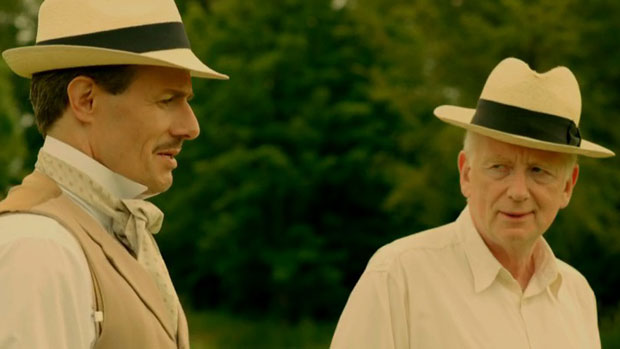37 Days: cricket and sang-froid as Britain awaited World War I
BBC2's crisp and convincing drama is set in August 1914 as the lamps were going out all over Europe

A free daily email with the biggest news stories of the day – and the best features from TheWeek.com
You are now subscribed
Your newsletter sign-up was successful
WHEN Napolean called on his men to bring forth lucky generals, he was no doubt hoping to avoid the likes of Sir Edward Grey.
Sir Edward’s younger brother was eaten by a lion, his older brother was gored to death by a buffalo, and his wife, more conventionally, was thrown fatally from a horse.
He also had the misfortune to be British Foreign Secretary in August 1914 as, in his own resonant words, the lamps were going out all over Europe.
The Week
Escape your echo chamber. Get the facts behind the news, plus analysis from multiple perspectives.

Sign up for The Week's Free Newsletters
From our morning news briefing to a weekly Good News Newsletter, get the best of The Week delivered directly to your inbox.
From our morning news briefing to a weekly Good News Newsletter, get the best of The Week delivered directly to your inbox.
In 37 Days, a crisp and convincing BBC2 drama set in the weeks before the outbreak of war, Ian McDiarmid plays the unlucky Foreign Secretary as a man utterly at ease with himself and the diplomatic waters in which he swims.
As Europe responds to the assassination of the Austrian archduke, Sir Edward glides between the Foreign Office, his London club and the cricket field, where he entertains the German ambassador.
“I’ve been reassured by the Austrian silence,” he tells the German, who knows that his own government is desperately trying to rouse the Austrians out of it. “I think that’s a good sign, don’t you?”
Nor is Sir Edward alone in his sang-froid. His Establishment chums are equally convinced that Sarajevo’s little local difficulty is merely a distraction from the real threat to British peace: civil war in Ireland.
A free daily email with the biggest news stories of the day – and the best features from TheWeek.com
The lone dissenting voice comes from the First Lord of the Admiralty, a certain Winston Churchill. “The only gesture the Kaiser will understand is the raised hand,” he says.
Like Sir Edward, 37 Days has faith in the power of words. It builds momentum through dialogue. In less competent hands, three hours of long speeches and faltering diplomacy might have landed with a deadening thump, but the pace here is taut and compelling.
It looks good too. With the handsome architecture of the European capitals and a flush of uniforms and moustaches, it could hardly not - but the costume doesn’t come before the drama. As a result, the characters have an unusual solidity.
It is painful to watch as they while away their sunlit evenings, oblivious to what awaits them: not only the disaster of war, but also the end of the old order which has served them so well.
37 Days' continues tonight at 9pm on BBC2.
Holden Frith is The Week’s digital director. He also makes regular appearances on “The Week Unwrapped”, speaking about subjects as diverse as vaccine development and bionic bomb-sniffing locusts. He joined The Week in 2013, spending five years editing the magazine’s website. Before that, he was deputy digital editor at The Sunday Times. He has also been TheTimes.co.uk’s technology editor and the launch editor of Wired magazine’s UK website. Holden has worked in journalism for nearly two decades, having started his professional career while completing an English literature degree at Cambridge University. He followed that with a master’s degree in journalism from Northwestern University in Chicago. A keen photographer, he also writes travel features whenever he gets the chance.
-
 Is Andrew’s arrest the end for the monarchy?
Is Andrew’s arrest the end for the monarchy?Today's Big Question The King has distanced the Royal Family from his disgraced brother but a ‘fit of revolutionary disgust’ could still wipe them out
-
 Quiz of The Week: 14 – 20 February
Quiz of The Week: 14 – 20 FebruaryQuiz Have you been paying attention to The Week’s news?
-
 The Week Unwrapped: Do the Freemasons have too much sway in the police force?
The Week Unwrapped: Do the Freemasons have too much sway in the police force?Podcast Plus, what does the growing popularity of prediction markets mean for the future? And why are UK film and TV workers struggling?